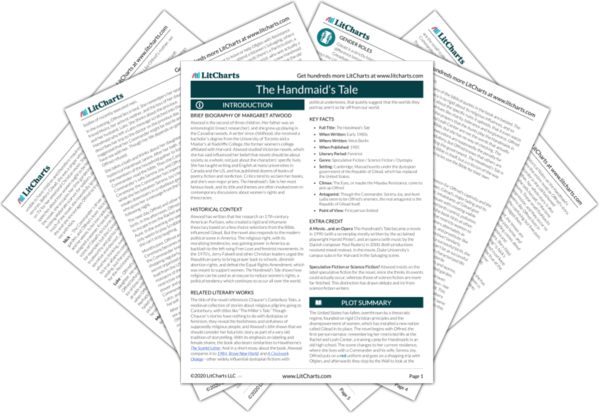The structure of The Handmaid’s Tale is characterized by many different kinds of storytelling and fiction-making. For one, the title itself, and the fictional “Historical Notes on the Handmaid’s Tale” of the book’s end, frame the entire novel as Offred’s story, that she’s said into a tape recorder in the old fashioned storytelling tradition. For another, her whole story is also punctuated by shorter stories she tells herself, of the time before Gilead or Aunt Lydia’s lessons. These small flashbacks can be triggered by the slightest impression, and they occur so often throughout the novel that it seems like Offred lives in several worlds, the terrible present, the confusing but free past, and the Rachel and Leah Center that bridged them.
Adding to the overlap of past and present, the tenses are always shifting, with some memories in the past tense, and some in the present. A third form of storytelling comes about because of the constant atmosphere of paranoia and uncertainty. Offred constantly makes up fictions. She’s filled with questions—is Ofglen a true believer, or lying? Is Nick’s touching her foot accidental, or intentional? Offred must keep several stories in mind at once, imagining each to be true at the same time. This form of storytelling is most clear in her imaginings about Luke’s fate, where he could be dead, imprisoned or maybe escaped.
Fourth, Offred also uses storytelling as a pastime. Since she has no access to any entertainment, and very few events happen in her life, she often goes over events from other people’s points of view, making up very involved fictions about what others might be thinking and saying. One major example is her long imaginary recreation of Aunt Lydia and Janine talking about Moira. Another is her creative ideas about what Nick might think of her and the Commander’s relationship. With more stories and memories than current-time actions, the book is profoundly repetitive. It forms its own kind of simple, quiet hell—we, like Offred, are trapped within the echo-chamber of her mind.
Storytelling and Memory ThemeTracker

Storytelling and Memory Quotes in The Handmaid’s Tale
We yearned for the future. How did we learn it, that talent for insatiability?

Unlock explanations and citation info for this and every other The Handmaid’s Tale quote.
Plus so much more...
Get LitCharts A+I try not to think too much. Like other things now, thought must be rationed.
I would like to believe this is a story I’m telling. I need to believe it. I must believe it. Those who can believe that such stories are only stories have a better chance.
We thought we had such problems. How were we to know we were happy?
But this is wrong, nobody dies from lack of sex. It’s lack of love we die from.
You wanted a women’s culture. Well, now there is one. It isn’t what you meant, but it exists. Be thankful for small mercies.
You can think clearly only with your clothes on.
But people will do anything rather than admit that their lives have no meaning. No use, that is. No plot.
All I can hope for is a reconstruction: the way love feels is always only approximate.
Humanity is so adaptable, my mother would say. Truly amazing, what people can get used to, as long as there are a few compensations.
We must be cautious about passing moral judgment upon the Gileadean. Surely we have learned by now that such judgments are of necessity culture-specific…our job is not to censure but to understand.”











